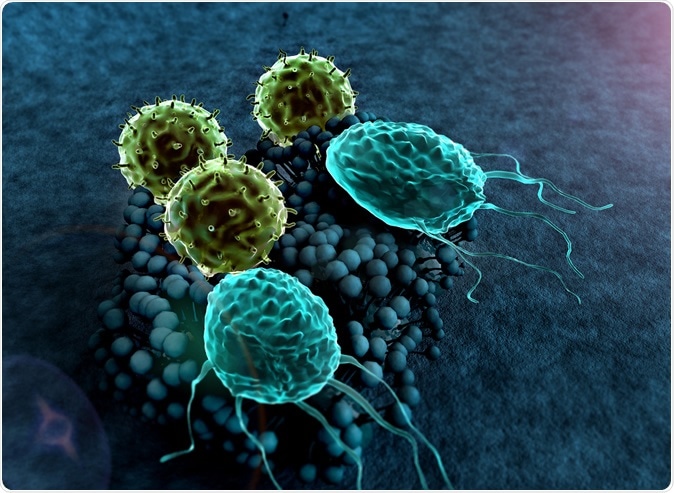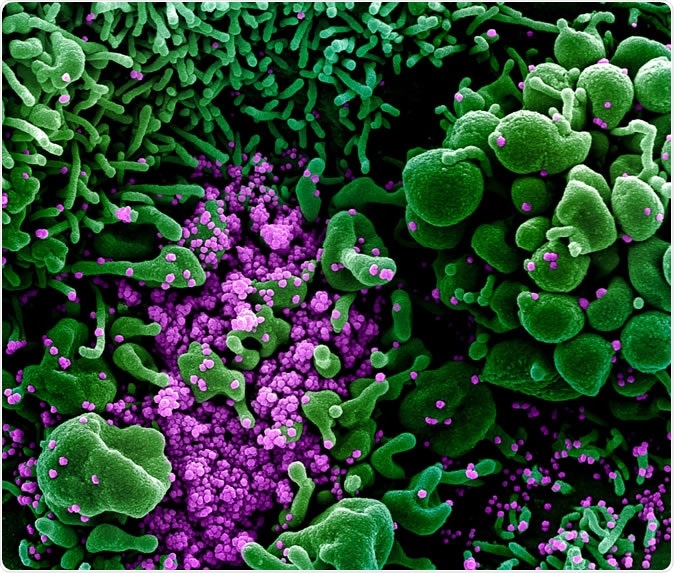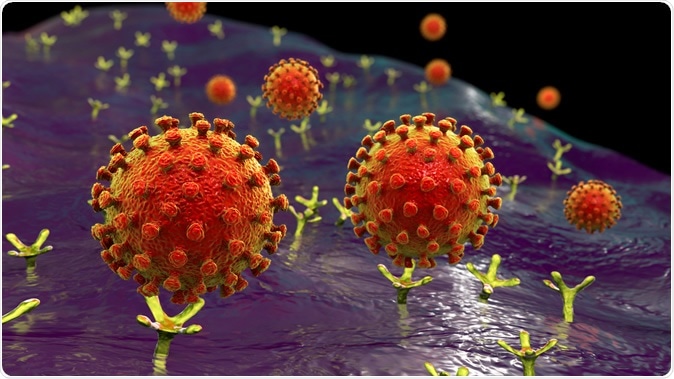The immune system has many components that work together in protecting the body from foreign invaders. One of the most important types of immune cells is T lymphocytes or T cells, a type of white blood cell that acts as the core of adaptive immunity, the system that modifies the immune response to specific pathogens.

T-lymphocytes attack a colony of fungi. Image Credit: UGREEN 3S / Shutterstock
Now, a team from the United States and China revealed evidence that the coronavirus disease, caused by the severe acute respiratory syndrome coronavirus (SARS-CoV-2), attacks the immune system’s T lymphocytes. The worrying findings highlight the destructive power of the novel coronavirus, which can destroy the immune system, leaving the patient unable to fight off the infection.
The novel coronavirus
Coronaviruses have been causing problems in humans for a long time. Though many versions of the virus are known to trigger only mild symptoms such as common colds. However, three recent types of coronavirus have caused deadly diseases – the severe acute respiratory syndrome (SARS) in China in 2002, the Middle East respiratory syndrome (MERS) in Saudi Arabia in 2012, and the current global pandemic, the coronavirus disease (COVID-19), which first emerged in Wuhan City, Hubei Province, in China December 2019.
The impact of the previous coronavirus outbreaks in 2002 and 2012 has been mild compared with the mayhem unleashed by the SARS-CoV-2. Within only a few months, the novel coronavirus has prompted most countries to go into lockdown, dwindling economies, and overwhelming health care systems with the more than 2 million people infected.
Meanwhile, scientists across the globe are racing to understand the SARS-CoV-2-in the hope of finding a treatment or cure. Now, the researchers’ surprise discovery has shed light on the potency of the novel coronavirus is killing powerful immune cells, which are supposed to kill the virus instead.

Novel Coronavirus SARS-CoV-2 Colorized scanning electron micrograph of an apoptotic cell (green) heavily infected with SARS-COV-2 virus particles (purple), isolated from a patient sample. Image captured and color-enhanced at the NIAID Integrated Research Facility (IRF) in Fort Detrick, Maryland. Credit: NIAID
Taken as hostage
The researchers from the Fudan University in Shanghai, China, and the New York Blood Centre, has studied the virus’s action on T-lymphocyte cell lines. T lymphocytes or T cells work by identifying and eliminating foreign invaders in the body.
To arrive at their findings, published in the journal of Cellular & Molecular Immunology, the team captured a cell infected by the virus, penetrated the membrane, and injected toxic chemicals into the cell. After this, the chemicals killed both the virus and infected cells by tearing them into pieces.
Surprisingly, the team has found that when the coronavirus and the T cell came into contact with each other, the T cell became prey to the coronavirus, wherein a structure in the spike of the coronavirus triggered the attachment of a viral envelope and the cell membrane. After, the genes of the virus entered the T cell and overwhelmed it, took it hostage, and deactivated its ability to protect the body.
The team then tried to do the same with the SARS virus, and another coronavirus, but these pathogens were not able to infect T cells. The researchers suspect that the SARS virus, which caused an outbreak in 2002 to 2003, has a lack of a membrane fusion function. The virus can only infect cells that have a particular receptor protein called the angiotensin-converting enzyme 2 (ACE2). T cells contain only a few ACE2 receptor proteins.

SARS-CoV-2 viruses binding to ACE-2 receptors on a human cell, the initial stage of COVID-19 infection, conceptual 3D illustration credit: Kateryna Kon / Shutterstock
It is an important discovery, knowing the effect of the SARS-CoV-2 on T cells, since this may show why the disease is spreading so quickly, and infecting so many across the globe. It also explains why certain vulnerable populations are at a high risk of dying from the infection, including those who are more than 65, those who are immunocompromised, and those with underlying medical conditions like lung disease, heart disease, diabetes, and hypertension.
Further investigation shows that patients who died from COVID-19 had damage to their bodies similar to both SARS and HIV. Also, the team found that unlike HIV that replicates faulty T cells, the coronavirus does not replicate, showing that the T cells and the virus may end up dying together.
Video of T Cells
Killer T Cell: The Cancer Assassin
Source:
COVID-19 Dashboard by the Center for Systems Science and Engineering (CSSE) at Johns Hopkins University (JHU). (2020). https://gisanddata.maps.arcgis.com/apps/opsdashboard/index.html#/bda7594740fd40299423467b48e9ecf6
Journal references:
Correction notice: This article was on 14th April 2020 edited to correct the citation and link to the scientific paper.
Wang, X., Xu, W., Hu, G. et al. SARS-CoV-2 infects T lymphocytes through its spike protein-mediated membrane fusion. Cell Mol Immunol (2020). https://www.nature.com/articles/s41423-020-0424-9